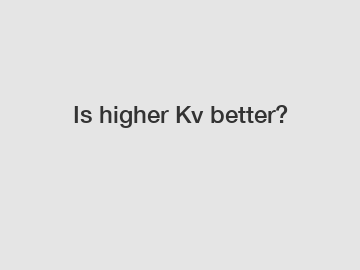Is higher Kv better?
Is higher Kv better?
The answer to this question is not as straightforward as it may seem. While many people believe that a higher Kv rating is always better, the truth is that it depends on the specific application and the preferences of the user. In this article, we will delve into the reasons behind this and discuss the implications and impact of higher Kv ratings.
Firstly, let us clarify what Kv rating actually means. Kv stands for the constant velocity factor of a motor, which refers to the number of revolutions per minute (RPM) that the motor can achieve when an applied voltage is given. It is commonly used to measure the speed characteristics of electric motors, particularly in the field of remote-controlled vehicles and drones.

One might naturally assume that a higher Kv rating would result in a faster motor, and thus be better in all circumstances. However, this is not necessarily the case. The tradeoff for higher Kv ratings is often reduced torque, which can negatively impact the motor's ability to handle heavy loads or maintain stability at low speeds. Additionally, higher Kv ratings can result in increased power consumption and decreased efficiency.
When it comes to remote-controlled vehicles, the desired Kv rating depends on the intended use. For applications that prioritize speed, such as racing drones or high-speed RC cars, a higher Kv rating is generally preferred. This is because these vehicles require a motor that can achieve high RPMs to attain top speeds. On the other hand, for applications that require more control and precision, such as aerial photography drones or rock crawlers, a lower Kv rating is typically favored. These applications benefit from motors with higher torque and better efficiency at lower speeds.
Furthermore, it is crucial to consider the battery voltage and propeller size when determining the appropriate Kv rating. Higher Kv motors are more suitable for higher voltage batteries and smaller propellers, as they can spin faster and generate more thrust. Conversely, lower Kv motors are better suited for lower voltage batteries and larger propellers, as they can generate more torque and be more energy-efficient.
In conclusion, the question of whether higher Kv is better cannot be definitively answered. It ultimately depends on the specific application and user preference. Understanding the tradeoff between speed and torque, as well as considering the battery voltage and propeller size, is key in selecting the appropriate Kv rating for a motor. By carefully considering these factors, users can maximize the performance and efficiency of their remote-controlled vehicles or drones.
If you are looking for more details, kindly visit best drone motor, halls propeller service, t-motor f7 hd.
217
0
0

Comments
All Comments (0)